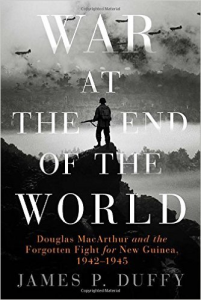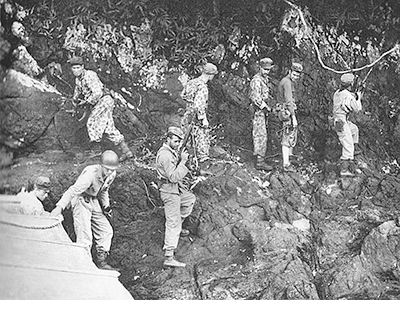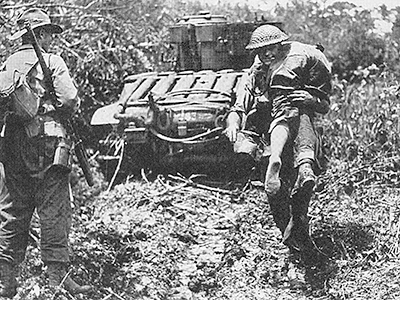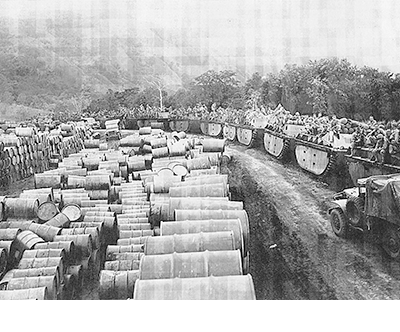A Book Review
of James P. Duffy’
War At The End Of The World
Douglas MacArthur and the Forgotten Fight for New Guinea 1942-1945
By Lance Zedric
 Mud. Insects the size of a man’s hand. Snakes as long as a car. Razor-sharp grass. Crocodiles. Raging rivers. Swamps. Headhunters. Triple canopy jungle. Oppressive heat. Disease. Torrential rain. Jagged mountains. No roads. An implacable enemy. Bloody shits. And more mud. New Guinea was a hell of a place to fight a war.
Mud. Insects the size of a man’s hand. Snakes as long as a car. Razor-sharp grass. Crocodiles. Raging rivers. Swamps. Headhunters. Triple canopy jungle. Oppressive heat. Disease. Torrential rain. Jagged mountains. No roads. An implacable enemy. Bloody shits. And more mud. New Guinea was a hell of a place to fight a war.
In his book, War At The End Of The World: Douglas MacArthur and the Forgotten Fight for New Guinea 1942-1945 (NAL 2016), James P. Duffy offers a masterful accounting of MacArthur’s motivations and actions after being driven from the Philippines in the dark, early days of World War II, and the myriad obstacles he faced, including inter-service rivalry, a Europe first policy, and the constant struggle to obtain men and materiel to win in a backwater of the theater. For New Guinea was not only crucial to the safety of Australia, regaining the resource-rich East Indies, and as a staging area to retaking the Philippines, it was key to winning the war.
For many casual readers, the military campaign in New Guinea in World War II with its unfamiliar geography and tongue-twisting place names has long been difficult to understand and digest, but Duffy cuts, slices, and dices it into bite-size portions that the general reader can enjoy. He offers a tasty helping of traditional meat and potatoes military history and seasons it with an even mix of personal anecdotes and insights about MacArthur and his relationship with Roosevelt, Nimitz, King, Eisenhower, and other major players of World War II. In a refreshing twist, Duffy is neither a harsh critic nor a gushing sycophant of MacArthur, and unlike some authors who sell out just to cater to the market, he avoids being too sweet or acidic. Moreover, he provides firsthand accounts by Japanese leaders and common soldiers that balance the narrative and offer insight into the enigmatic mind of an enemy that we did not understand.
War at the End of the World is well-written, solid history and a much-needed literary contribution on a relatively obscure theater of the war. Regardless of one’s opinion about MacArthur, (and Duffy offers views from both camps on his effectiveness and genius), he did lead 87 amphibious landings during the war covering thousands of miles, and at the end of the day, played a central role in conducting and winning the war. All of which helped cement his place among the giants of military history.
Clearly, victory in the Pacific began with a hard fought victory in New Guinea. And although to the thousands of men who fought and languished in its extremes, it might not have been the end of the world, according to Duffy, “they could see it from there.”
Buy the book!




